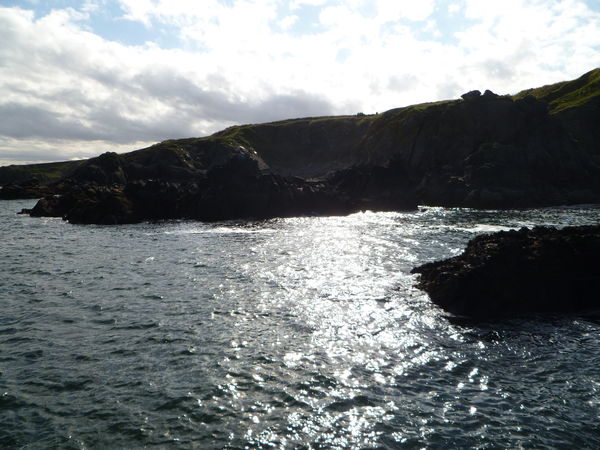Sun shimmering on water
Nov 29, 2012 15:40:50 #
I drove across the bridge at the north end of the lake near my house today. The sun, of course, is now in the southern hemisphere, so it glistened off the water and was broken up by the waves. My question is, to get a good photo of this, should I use a polaroid filter, a nd filer or none at all?
Nov 29, 2012 15:56:43 #
If you don't want to see the reflections, you can try a polarized filter. Depending on the angle you shoot from, you may be able to eliminate quite a lot of the reflection.
You would only use an ND filter if you wanted to make the image darker for some reason, or use a wider aperture, or longer shutter speed (I use an ND filter to take long exposure pictures of moving water, for example.)
A graduated ND filter might be useful here too. This is a filter that's clear on one end, and fades into a ND filter on the other end. You could use it to darken up the sky if it's getting washed out in your pictures, without darkening the water too much.
If you LIKE the reflections, no filter is necessary. Hope that helps!
You would only use an ND filter if you wanted to make the image darker for some reason, or use a wider aperture, or longer shutter speed (I use an ND filter to take long exposure pictures of moving water, for example.)
A graduated ND filter might be useful here too. This is a filter that's clear on one end, and fades into a ND filter on the other end. You could use it to darken up the sky if it's getting washed out in your pictures, without darkening the water too much.
If you LIKE the reflections, no filter is necessary. Hope that helps!
Nov 29, 2012 15:59:00 #
Yes, I want to get the reflections, but the reflections are much brighter than everything else that would be in the photo.
Nov 29, 2012 16:19:28 #
If your camera's sensor is CCD, it will be prone to streaking, but if it's a recent CMOS sensor, you may find that you can get away with photographing the sparkles directly. I found that keeping the aperture small helped to avoid streaking.
Nov 29, 2012 16:24:38 #
You may also find that it's a question of quantity. The camera may tolerate a small amount of reflected light, but too much will cause streaking or saturation.
This was on the limit of my compact.

Nov 29, 2012 16:35:26 #
I'll give it a shot using several different speeds to see how the surrounding features come out in comparison to the reflected sun.
Nov 29, 2012 16:41:47 #
It's a great effect and worth trying to capture. You'll probably find that a slow speed and a high f setting will give the camera an easier time of it. A tripod or monopod will help with the long exposure time (unless you've got REALLY steady hands).
PS Be sure to show us the results. I've got more examples of it not being captured quite right (camera limitations, of course), but that's probably not what you're looking for.
PS Be sure to show us the results. I've got more examples of it not being captured quite right (camera limitations, of course), but that's probably not what you're looking for.
Nov 29, 2012 17:45:28 #
If the water is too bight, a graduated ND filter would help. Flip it so the dark side is on the bottom. It will keep the water from becoming too over exposed while the rest of the image has time to come to the correct exposure.
You could also try bracketing your exposures, and blending them manually in a program like Photoshop, or GIMP. Not HDR really, just a blend of exposures.
You could also try bracketing your exposures, and blending them manually in a program like Photoshop, or GIMP. Not HDR really, just a blend of exposures.
Nov 29, 2012 17:49:21 #
Kat Landreth wrote:
If the water is too bight, a graduated ND filter would help. Flip it so the dark side is on the bottom. It will keep the water from becoming too over exposed while the rest of the image has time to come to the correct exposure.
You could also try bracketing your exposures, and blending them manually in a program like Photoshop, or GIMP. Not HDR really, just a blend of exposures.
You could also try bracketing your exposures, and blending them manually in a program like Photoshop, or GIMP. Not HDR really, just a blend of exposures.
That sounds like a plan. I've never done that before but I do have PSE 10.
Nov 30, 2012 07:37:42 #
SteveR wrote:
I drove across the bridge at the north end of the lake near my house today. The sun, of course, is now in the southern hemisphere, so it glistened off the water and was broken up by the waves. My question is, to get a good photo of this, should I use a polaroid filter, a nd filer or none at all?
Living near the water, I find myself constanly battling the sun's reflection and my constant companion on bright days is my polarizing filter. You can use and ND and turn it upside down however, I get better results with the polarizer. Remember that this filter works best at 45 degree andgle from the sun.
Nov 30, 2012 08:31:28 #
SteveR wrote:
That sounds like a plan. I've never done that before but I do have PSE 10.
Kat Landreth wrote:
If the water is too bight, a graduated ND filter would help. Flip it so the dark side is on the bottom. It will keep the water from becoming too over exposed while the rest of the image has time to come to the correct exposure.
You could also try bracketing your exposures, and blending them manually in a program like Photoshop, or GIMP. Not HDR really, just a blend of exposures.
You could also try bracketing your exposures, and blending them manually in a program like Photoshop, or GIMP. Not HDR really, just a blend of exposures.
That sounds like a plan. I've never done that before but I do have PSE 10.
I'm not sure of PSE 10, but LR4 has a slider for Shadow. If you expose for the sparkles, the surrounding land will be dark, but the shadow control should bring out some detail. The nice thing about digital is that you can take lots of pictures and experiment.
Show us your results.
Nov 30, 2012 09:01:03 #
Well, my inexperience is going to show here, but her goes. I bought a Tiffen filter kit a while back and it had a "polorizer" filter in the kit. To my surprise, the filter can spin. I really dont see a difference in looking through the filter and spining it looking at a lake with sun glaring off it. I did take some awsome pictures of a boat race with the filter on the lense, of boats you couldnt see with your eyes in the glare of the sun. Did I get lucky? Thank you Robert
Nov 30, 2012 09:09:10 #
Robert jh wrote:
I did take some awsome pictures of a boat race with the filter on the lense, of boats you couldnt see with your eyes in the glare of the sun. Did I get lucky? Thank you Robert
No, you discovered physics. A polarizer will reduce glare on most objects when the sun is at a 90 degree angle to the camera. Rotate the filter to get the effect you want. When you used the filter the first time, you weren't at the right angle to the sun.
Polarizing filters are great because they reduce glare and enhance colors. Cheap filters are not necessarily the best. I read some reviews and got a couple of Marumi polarizers. A tip: Get a polarizer for your largest lens, or just get a 77mm filter. Then get a set of step-up rings, so you can use that one filter on all your lenses. You'll save a lot of money.
Nov 30, 2012 09:56:15 #
Hi jerry, I thank you for replying. Well I dont have many sunny days on the lake any more but I think I have a grip on what you are saying,in that turning the filter while looking through the view finder will change the effects? If that is the case I did get lucky in that I wanted no glare on the race boats. That is a great tip about getting step up rings, so THANK YOU! Robert
Nov 30, 2012 09:59:46 #
Robert jh wrote:
Hi jerry, I thank you for replying. Well I dont have many sunny days on the lake any more but I think I have a grip on what you are saying,in that turning the filter while looking through the view finder will change the effects? If that is the case I did get lucky in that I wanted no glare on the race boats. That is a great tip about getting step up rings, so THANK YOU! Robert
I waqsted a lot of money buying cheap polarizers for each lens I owned. Now I have a quality polarizer that I can use on any lens. Thanks to UHH.
If you want to reply, then register here. Registration is free and your account is created instantly, so you can post right away.



